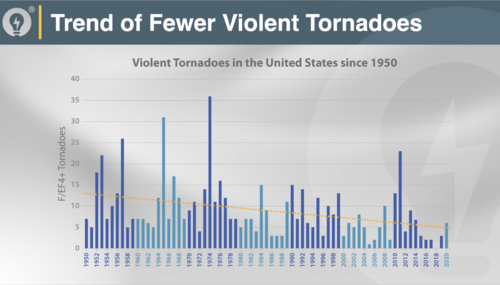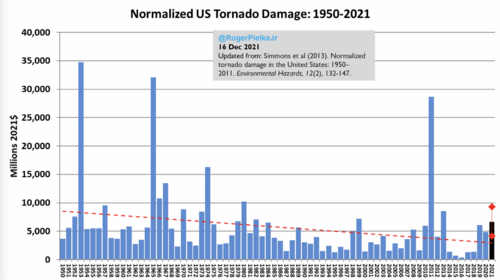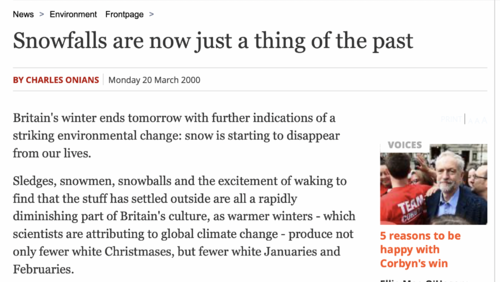-
While Stormtrack has discontinued its hosting of SpotterNetwork support on the forums, keep in mind that support for SpotterNetwork issues is available by emailing [email protected].
You are using an out of date browser. It may not display this or other websites correctly.
You should upgrade or use an alternative browser.
You should upgrade or use an alternative browser.
Number of Supercells to increase due to global warming
- Thread starter Jonathan Scrogham
- Start date
Mark Gressman Jr
Supporter
I wonder how a warmer climate will affect tornado production within the increasing number of supercells. If I understand it correctly, I would think warmer overall temps might lessen the pressure gradient, thus lessening wind speed/ shear. If that logic is sound, I'm not sure how that plays into the overall tornado numbers. Gives me one more thing to add to a massive list of topics I need to read up on, lol!
I've seen various articles over the years saying that storms will be getting stronger & more numerous.
But if anything where I'm at, it seems like just the opposite: seems like there's less thunderstorms than there used to be & they're weaker too..
(that said, I'm talking normal thunderstorms, not supercells, as supercells aren't common here)
I really don't put much belief in those dire 'global warming' predictions...
Gonna go read that article anyway
But if anything where I'm at, it seems like just the opposite: seems like there's less thunderstorms than there used to be & they're weaker too..
(that said, I'm talking normal thunderstorms, not supercells, as supercells aren't common here)
I really don't put much belief in those dire 'global warming' predictions...
Gonna go read that article anyway
JamesCaruso
Staff member
Seems we’ve been complaining that chasing has generally sucked for over a decade now (relative to earlier decades), even while hearing about global warming that whole time.
rdale
EF5
I've seen various articles over the years saying that storms will be getting stronger & more numerous.
But if anything where I'm at,
Doh - let me stop you there
I really don't put much belief in those dire 'global warming' predictions...
Ugh. You did it.
1) This isn't "dire" as a 6% chance isn't something that you would ever detect in your area let alone chasing.
2) Science isn't a "belief system" but based on evidence and modeling. If you have something that refutes their study - by all means publish it.
But don't push back because of your beliefs.
Carry on
Mike Smith
EF5
There is no reason to believe that global warming is going to cause worsening violent tornadoes.
Let's step through the evidence.
Classic climate change theory says the poles will warm more quickly than the tropics. That is exactly what has happened. As we all know from Synoptic Meteorology 101, when there is less temperature contrast between north and south, there is less of a jet stream (of course, I'm simplifying). A lesser jet stream means fewer opportunities for violent tornadoes.
So, with that hypothesis, let's look at the data. Here is a graph of violent (F-4/5) tornadoes since 1950.

The numbers for 2021 = 3 and '22 = 4. EF-5's have become vanishingly rare as it has been ten years since the last.
While this would seem to be enough to prove that violent tornadoes will not increase due to global warming, let's see if we can find more evidence.
We know that 75% of tornado damage is caused by violent storms. So, if violent storms are decreasing, then we would expect normalized damage to decrease. And, that is what has occurred. Here is the peer-reviewed data.

So, we know that earth's warmer atmosphere = fewer violent tornadoes. It is a positive aspect to a warmer climate.
Let's step through the evidence.
Classic climate change theory says the poles will warm more quickly than the tropics. That is exactly what has happened. As we all know from Synoptic Meteorology 101, when there is less temperature contrast between north and south, there is less of a jet stream (of course, I'm simplifying). A lesser jet stream means fewer opportunities for violent tornadoes.
So, with that hypothesis, let's look at the data. Here is a graph of violent (F-4/5) tornadoes since 1950.

The numbers for 2021 = 3 and '22 = 4. EF-5's have become vanishingly rare as it has been ten years since the last.
While this would seem to be enough to prove that violent tornadoes will not increase due to global warming, let's see if we can find more evidence.
We know that 75% of tornado damage is caused by violent storms. So, if violent storms are decreasing, then we would expect normalized damage to decrease. And, that is what has occurred. Here is the peer-reviewed data.

So, we know that earth's warmer atmosphere = fewer violent tornadoes. It is a positive aspect to a warmer climate.
rdale
EF5
And JamesK you can see in Mike’s post what happens when you hand draw lines to show your point when you don’t actually have the data to prove your point. “Publish or Perish” - or as Mike does “use PowerPoint if you can’t publish” 
Take your politics out of your science and stick with facts.
Take your politics out of your science and stick with facts.
Mike Smith
EF5
stick with facts
That's exactly what I do.
What problem you have with SPC, Rob? That's from where the tornado numbers come. The line is originally from NCDC. They stopped updating in 2017 because their predicted increase never materialized. As the lowering trend continued, I simply extended their line.
What problem do you have with peer-reviewed data? The bottom graph comes from Pielke and Simmons and is a cut-and-paste. The line is theirs. You can find the original here: US Tornado Damage 1950 to 2021
rdale
EF5
I have problems with people who think that the louder they yell, the more their unverified claims will spread. I was just suggesting you stick to areas you know, where you can salvage your legacy, and clearly climate change isn't an area you have education or training in.
I'm sorry, I didn't mean to cause any arguments. I just thought it was interesting and wanted to share it.
rdale
EF5
It’s a very interesting story - the research is important. That’s just Mike 
JamesCaruso
Staff member
I really don't put much belief in those dire 'global warming' predictions...
2) Science isn't a "belief system" but based on evidence and modeling. If you have something that refutes their study - by all means publish it.
I'm sorry, I didn't mean to cause any arguments. I just thought it was interesting and wanted to share it.
“Belief” may be a poor choice of words, but when people say that, what they really mean is, show some intellectual humility. We all know from actual experience that models get things wrong: weather models, climate models, economic models, Covid models. We all know that many things we thought we knew in the past - from science - have turned out to be false. By definition, we cannot know what it is today, that will turn out to be wrong tomorrow. When people say they do not “believe” - again, poor choice of words - they are saying, is the *alarmist nature* of global warming warranted? Even if it is, can we really do much to change it? Should we have a wholesale reinvention of our way of life, with trillions of dollars of government spending to subsidize green technologies, and unknown, unintended consequences, to “solve” it (while other countries go in the opposite direction)? Maybe yes, maybe no. But are those not valid questions to be asked by American taxpaying citizens? Why does everyone get so torqued up even by questions being asked, as if it’s some religious belief being questioned? Common sense often has been right when the intellectual elites were wrong. Persuade the non-scientists, don’t disparage them. The data may say there has been global warming, but how does the data compare with the dire predictions from 35 years ago?
@Jonathan Scrogham you have nothing to apologize for. It’s a shame that it has gotten so politicized. Any other scientific theory can be questioned, but not global warming!
JamesCaruso
Staff member
And JamesK you can see in Mike’s post what happens when you hand draw lines to show your point when you don’t actually have the data to prove your point. “Publish or Perish” - or as Mike does “use PowerPoint if you can’t publish”
Take your politics out of your science and stick with facts.
I have seen many posts on ST about the declining incidence of EF-3+ tornados in recent years. Why is what @Mike Smith posted so controversial or “political”?
And he is not even saying there’s no global warming. He is just saying that global warming actually reduces baroclinic contrasts and the associated severe weather - I have seen that cited in numerous places, even by the most ardent global warming evangelists. Not sure what is so troubling about Mike’s post.
rdale
EF5
“Belief” may be a poor choice of words, but when people say that, what they really mean is
Ehh - don't put words into anyone's post. I was just making it clear that science isn't a faith-based system that you believe in.
We all know from actual experience that models get things wrong: weather models, climate models, economic models, Covid models.
True, but there may be some confusion on modeling if you are equating climate models with economic models.
is the *alarmist nature* of global warming warranted?
If the alarmist nature is the most likely outcome - then yes. But typically it is not - just like Mike knows, he who screams the loudest and makes the most outlandish claims gets the press. There's a reason Al Gore and Mike Smith aren't being published in scientific journals.
The data may say there has been global warming, but how does the data compare with the dire predictions from 35 years ago?
Surprisingly well!
Any other scientific theory can be questioned, but not global warming!
You can question it - but with science, not fancy PowerPoint slides and hand-extrapolated lines on a chase forum. Notice Mike has yet to refute any of Dr Ashley's claims directly.
For those interested in the science - I highly suggest "A Thinking Person's Guide to Climate Change" from the AMS.
Mike Smith
EF5
Notice Mike has yet to refute any of Dr Ashley's claims directly.
I did exactly that, at least as Dr. Ashley's hypothesis was presented by The Independent* article posted above. And, I did it using the scientific method. If you are not familiar with the scientific method, see here: The scientific method (article) | Khan Academy

As an article with the claim (above) that more tornadoes are on the way was cited, I directly refuted it. How?
- A scientific process explanation. No scientist of which I am aware disputes that the poles are warming more quickly than the tropics ( NASA - What's causing the poles to warm faster than the rest of Earth? ). Increasing temperature contrast between poles and tropics strengthens the jet stream and vice versa ( The Jet Stream ). I'm sure that every person on this board realizes the correlation between a strong jet and strong tornadoes.
- From that explanation based on the science of meteorology, we can form a hypothesis, "weaker jet stream = fewer violent tornadoes."
- The raw number of strong tornadoes, per NOAA, is way down. This wasn't a model forecast, it was data.
- But, I didn't stop there, I found a complementary data stream that leads to the same conclusion using a peer-reviewed technique. Again, not a computer model of the future, but hard data.
- Under the scientific method, we now have a theory: increasing temperatures due to greenhouse gas = fewer strong tornadoes. That is confirmed by basic atmospheric science + two independent data streams.
I did all of the refutation without calling anyone names or casting aspersions on anyone.
That is the scientific method...whether the results are what a given person might prefer. If someone can provide data that shows the number of violent tornadoes is increasing -- bring it on. Evolution of science is what makes it great!
*It was The Independent that, in 2000, published the infamous headline below. This shows just how far off forecasts of future climate might be.

Last edited:
Similar threads
- Replies
- 21
- Views
- 2K
- Replies
- 6
- Views
- 932
- Replies
- 0
- Views
- 613
